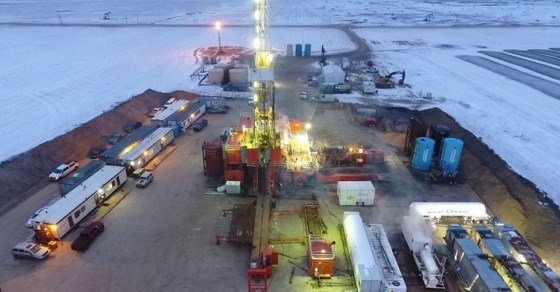A global glut in the supply of oil led to oil prices tanking into negative territory, and the result will be a major, if temporary, shutdown of oil production in Saskatchewan where pandemic lockdowns have cut into consumption.
Dan Cugnet, chairman of Valleyview Petroleums Ltd. of Weyburn, Saskatchewan, explained that the negative oil price on April 21 reflected the negative pricing that was already being experienced by oil producers.
The West Texas Intermediate (WTI) price dipped to minus $37 a barrel on April 21, and rose back up to around $10 a barrel the following day.
“We’ve been in negative pricing before WTI went negative,” said Cugnet, noting the price reflects futures contracts, in this case for the end of May.
According to a report by the Reuters news agency, the major oil hub at Cushing, Oklahoma was nearing capacity (about 73 million barrels of crude oil) with more oil on the way, and this caused traders to panic and send the oil price crashing to the negative for the first time ever.
The oil hub at Cushing feeds the major oil refineries on the Gulf Coast.
“A barrel of oil from southeast Saskatchewan is bought and sold 20 times before it reaches the refineries in Texas,” Cugnet explained, pointing out that the futures contracts were oversold and the surplus has filled up all of the capacity available.
The result is many companies are shutting production because they can’t sell any more crude oil at this point, and once the restrictions for COVID-19 are lifted, it will take a long time for demand to grow again and start using up the surplus oil supplies, said Cugnet. Nobody has any idea how long the lockdowns for COVID-19 are going to last, he added.
“For southeast Saskatchewan, I would expect little to no drilling going into Q2 and Q3 (second and third quarters). Drilling will be at a standstill, and they’re going to be shutting in,” he said, noting the oil companies will still have to pay property taxes even though there won’t be any production, and the government won’t get any royalties, which they depend on for their revenues.
This will mean, in turn, that a lot of oil company and service company employees aren’t working, and those dollars aren’t available for spending in the local economy, added Cugnet.
Prior to the pandemic, worldwide oil demand was about 100 million barrels a day, and due to the COVID-19 lockdowns, that’s gone down to about 70 million barrels a day, but refineries are still producing 100 million barrels every day.
“The problem grows exponentially,” he said. “It’s going to be very volatile and very chaotic.”
On a positive note, oil producers in southeast Saskatchewan have become adept at operating lean, since prices tanked in 2014, making things very tough for the industry ever since.
“We’re lean and efficient because of the environment we’ve been working in the last few years. For other producers, such as in the U.S., this is far more drastic for them,” Cugnet said. “The timing of how long this will be going on is the great unknown.”



